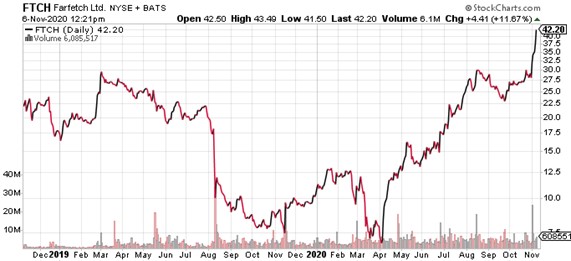It’s Wall Street folklore that beating Amazon.com, Inc. (Nasdaq: AMZN, Rated “B”) in retail is impossible, but shareholders of Farfetch Limited (NYSE: FTCH, Rated “D”) would beg to differ.
On Monday, shares of Farfetch, a London-based online retailer of luxury goods, soared nearly 20% on news Alibaba Group Holding Ltd. (NYSE: BABA, Rated “B”) was taking a stake in the company.
And it’s no surprise that such a successful company like Alibaba would want to take a stake. That’s because Farfetch has a competitive advantage Amazon can’t match: The appearance of exclusivity.
The English company operates both as a marketplace for luxury goods sold online and technology platform. It’s a unique position that allows it to help smaller boutiques seamlessly make the jump to ecommerce, while building out application programming interfaces for large brands. It’s a surprisingly big business that is growing like gangbusters as consumers become more comfortable making big ticket purchases online.
Amazon.com has made a concerted effort to play in this space. The Seattle-based company certainly has the logistical expertise to make this happen, but luxury brands have mostly demurred.
Last week, LVMH Moët Hennessy – Louis Vuitton SE (OTCPK: LVMHF, Rated “C”), the French luxury goods maker best known for its ultra-expensive leather case goods, became the latest retailer to turn down a request from Amazon.com to sell its brands.
Related post: This Ecommerce Company is Vital in the New Age of Retail
In addition to Louis Vuitton, LVMH controls multiple luxury brands, including Dior, Bulgari, Givenchy and the Sephora makeup stores. A storefront at Amazon.com would certainly add to sales volume. However, it would come at a cost. LVMH managers worry about diminishing the value of their brands by association with Amazon, a mass marketer.
Luxury goods makers thrive when their brands are associated with exclusivity. When designer purses and blouses become plentiful, prices decline, and so too does their perceived value. That’s the kiss of death for a luxury brand.
Facing the direct price competition from scores of third-party stores on Amazon.com doesn’t help, either. Some of these shops have been found to sell counterfeits. For example, in 2019, Nike, Inc. (NYSE: NKE, Rated “C”) and Amazon ended a turbulent two-year relationship when the athletic shoe and apparel company complained about fakes and price competition.
By contrast, Farfetch gives boutiques and brands complete control. Items can be either sold at its online store, or brands can use company APIs to build out their own branded ecommerce backends operating in the Farfetch cloud. Either way, clients gain full governance over store branding, product pricing and every aspect of inventory.
In the end, exclusivity is maintained.
But brands aren’t the only ones benefitting from the arraignment; the London-based business wins, too. It gets transactional income from products sold at its store, and consulting and hosting fees for building and providing the ecommerce backend infrastructure.
Related post: Tech Antitrust Will Destroy Trust, Not Tech
Most important, though, is the huge competitive advantage hosting these brands creates over Amazon.com, where no such assurances or services are offered, This advantage is showing up in spectacular sales growth.
The company had $1 billion in sales during 2019, up 69% year-over-year. And when the firm reported second-quarter financial results in August, sales ballooned to $364 million, up 74%.
Chinese technology conglomerate Alibaba is investing $300 million in Farfetch, according a report at The Information. The investment play is obvious. Chinese consumers make up a third of the global marketplace for luxury goods. The bet is Farfetch, with the backing of a major global tech business in an important geography, can bring more luxury goods brands online faster.
It’s a good bet. Shares are currently trading around $42.24. Savvy investors should use weakness as a buying opportunity.
Best wishes,
Jon D. Markman




